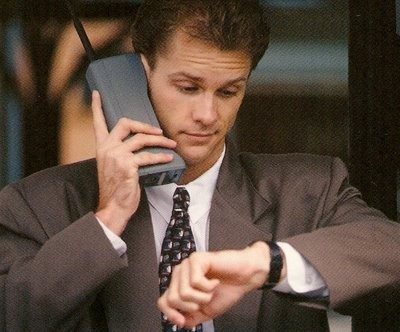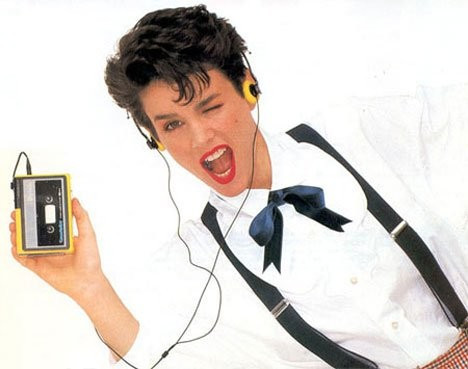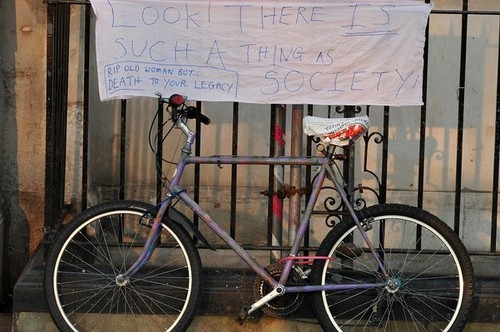Margaret Thatcher Consumed: Relics from the Age of the Iron Lady
From shoulderpads to Walkmans, IBTimes UK looks back at some of the other icons that defined the 80s along with the Iron Lady
It was the era defined by Margaret Thatcher but one which taste forgot: when people started spending "loadsamoney" on aspirational items and lfestyles.
Following her death from a stroke at the age of 87, MPs met for a special parliamentary session to pay tribute to the Iron Lady. Her political heir, Tory leader David Cameron told the House that she defined the age.
But what else summed up the 80s, a decade ruled by Thatcher from the beginning to the end?
IBTimes UK has collated some of the cultural icons and relics from the 1980s, the era in which Thatcher changed the face of Great Britain for good.
The 'big bang' reforms in the financial services industry by her government helped fuel a 'greed is good' culture of conspicuous consumption and fierce individualism - lampooned by comedian Harry Enfield's 'Loadsamoney' character.
But Thatcherism also endorsed an ethos of independence which supported people on ordinary wages who "got on their bike" and made things happen.
Ten of thousands of working class families aspired to and joined the property-owning democracy envisioned by her, then paid her back with votes at the ballot box.
Her legacy has become the subject of fierce debate again - a testament to how profound her impact on the country has been.
She created victims - plenty of them. Communities in coalmining and heavy industry areas were hit badly by the withdrawal of government subsidies as Thatcher rolled back the frontiers of the state.
The downfall of the USSR was also down in part to the former prime minister, in partnership with her close political friends US president Ronald Reagan and his Russian counterpart Michail Gorbachev.
Today, the future of communism lies very much in the past - along with some of these cultural relics.
Phones:

Mobile phones and computers dominate our lives today and both first became consumer iteams in the 1980s.
For yuppies, "brick phones" were a handy status symbol because they were so big that everybody was guaranteed to see you loudly boasting into it. The first of its kind was the Motorola DynaTAC 8000X, which went on sale in 1983.
There was a heavy price to pay too - and not only from carrying it around. A unit cost around £2,400.
Bottled beer:

Surprising as it may seem before the 1980s beer was not normally swigged straight from the bottle.
But the decade was the era of conspicuous consumption and display was very important indeed. And how can people know what continental and expensive tastes you have if they cannot see the sticker?
A swathe of sweet and fizzy lager brands swept traditional bitter in to the drip tray of history.
Sony Walkman:

Your music, anywhere. It was an appealing concept to which millions of people signed up by cocooning themselves in their own aural bubble from 1980 onwards.
It is probably stretching the proverbial headphone wire a bit to say the image of hundreds of joggers absorbed in their own world while running in a communal park was a metaphor for the atomisation of society - which critics accused Thatcher of presiding over.
Bicycle:

Of course, the bicycle was around long before Margaret Thatcher. But her government harnassed it as a metaphor for social mobility.
It was her loyal adjutant Norman Tebbit who coined the phrase "Get on your bike" by using it to eulogise self-sufficiency and a determined attitude in the face of worklessness at the 1981 Tory party conference.
Citing his father, Tebbit crushed a spotty young Conservative who suggested that the rioting that had ruptured inner cities that summer was a natural consequence of unemployment.
Tebbit replied: "He didn't riot. He got on his bike and looked for work, and he kept looking till he found it."
Opponents gleefully turned his words around to mean he was telling a whole generation to "get lost".
Shoulderpads:

Adding volume came into its own in the 1980s. Hair got big. Salaries got big. Unemployment got big. And so did fashion.
Maggie's "up" hairstyle was likened to a battle helmet and she certainly kept her cabinet in line.
If Thatcher wore her hair like a helmet during the 1980s, then shoulderpads were the armour. Dynasty ruled the TV airwaves along with Dallas, and nobody wore shoulderpads better than Joan Collins. She was the priestess of power-dressing and the style's highest embodiment in popular culture.
Now, as a divided Britain prepares to bury its most divisive leader, one question might be: Has 1980s Thatcherism ever ended in Britain?
© Copyright IBTimes 2025. All rights reserved.




















